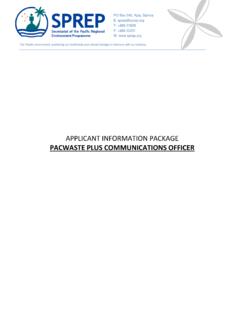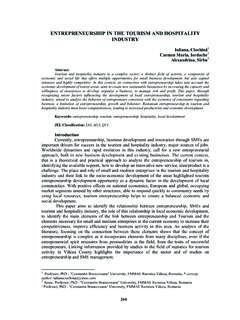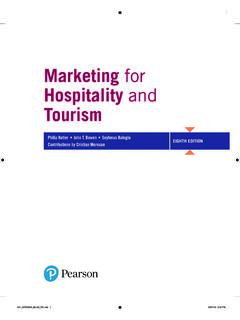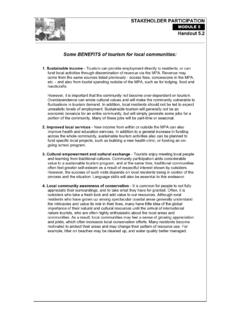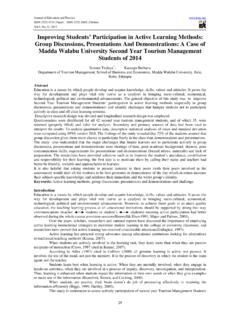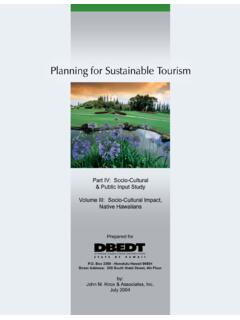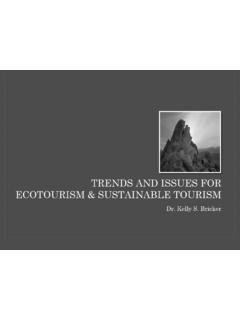Transcription of 23. The importance of culture in achieving sustainable ...
1 sustainable Development Brief 8th March 2013/SDWG 1 | Page 23. The importance of culture in achieving sustainable development Drafted by the Economic and Social Commission for Asia and the Pacific sustainable development occurs within cultural contexts. Therefore, culture must be integrated into sustainable development strategies. In addition culture is a driver of sustainable development. The cultural sector promotes economic growth through cultural tourism , handicrafts production, creative industries, agriculture, food and medicine, and fisheries.
2 Traditional agriculture and food preparation practices enhance food security. The interlinkage between cultural and natural heritage is a foundation for environmental sustainability and biodiversity preservation. In Pacific communities culture is the foundation of well-being, inclusiveness and resilience. One of the key challenges in the Pacific is to create understanding among governments and donor partners of the contribution of culture and the culture sector to sustainable development and well-being.
3 As in the case of other sectors, this requires improving the evidence base ( compiling cultural statistics); strong policy support; and a clear understanding of the role of culture as a cross-sectoral issue. Key Issues: Economic benefits of culture : culture contributes to economic development in many sectors, including tourism , creative industries, agriculture, food and medicine, and fisheries. Additionally, cultural practices provide food security and social safety nets for vulnerable populations, including women, children and elderly.
4 The implementation of the Pacific Regional culture Strategy at the national level provides a framework for culture as an engine of sustainable development. Valuing culture : There insufficient quantitative and qualitative evidence to support the economic and social benefits of culture . The lack of evidence has often resulted in an undervaluing of culture . The first Regional cultural Statistics Meeting was held in 2011 to build capacity in the area of cultural statistics.
5 The Pacific should to continue to work toward collecting data and improving the evidence-base on linkage between culture , well-being and sustainable development. This would help enhance awareness of both the non-monetary and monetary contribution of culture . Trade, marketing and access to finance: Strong pro- cultural policies for institutional capacity building; marketing of cultural products and protection of Intellectual Property Rights (IPRs); financing of small- and medium-sized cultural enterprises and initiatives; and promoting international trade of cultural products are necessary to harness the full potential of Pacific cultural industries.
6 Gender and human rights: culture in the Pacific has been used to justify inequity, discrimination and violence, especially against women, minorities and children. This is unacceptable and a misuse of culture . As noted in The Convention on the Elimination of All Forms of Discrimination Against Women, culture should not be used as an excuse for sustainable Development Brief 8th March 2013/SDWG 2 | Page behaviour which is not in accordance with human rights.
7 Pro- cultural policies should support culture as an enabler of tolerance, empowerment and diversity. Bio- cultural diversity: cultural activities and expression, including language, are integral to cultural preservation and social cohesion. The cultural practices rely on biodiversity, access to land and availability of natural resources, including both terrestrial and marine. Implementing cultural preservation policies, as well as infrastructure and facilities, including festivals, museums, etc.
8 , can support the preservation of traditional knowledge and the promotion of ethical and informed heritage tourism . Policy environment: culture is not only a sector, but it cuts across all dimensions of development policy. Synergy between policies and strategies for the preservation of culture , environmental sustainability and other areas are necessary for effective and efficient delivery. cultural preservation must occur at all levels, national, regional and local, to be effective.
9 Background: culture the foundation of well-being in the Pacific culture is a way of life; it includes cultural practices, norms and life-styles; it influences how people think and act. It is central to individual and collective identity and sense of belonging. It provides the social fabric that bonds communities and families; and is imperative to social cohesion and sustainable livelihoods. As such, culture is necessary not only for the confidence, creativity and happiness of people and communities, but for their survival.
10 The Vanuatu Alternative Indicators of Well-being pilot study highlights the importance of culture for well-being, environmentally friendly lifestyles and traditional social safety nets. The Rio+20 outcome document, entitled The Future We Want, acknowledged the natural and cultural diversity of the world and recognised that all cultures and civilisations can contribute to sustainable development . Furthermore, the Rio+20 stressed the import link between welfare and culture1.
